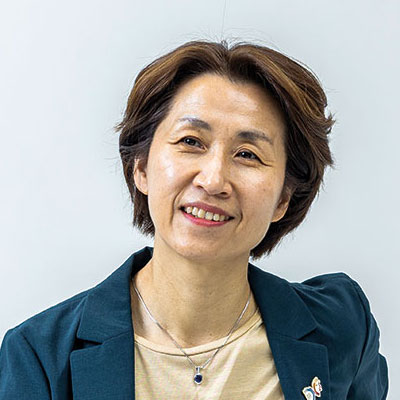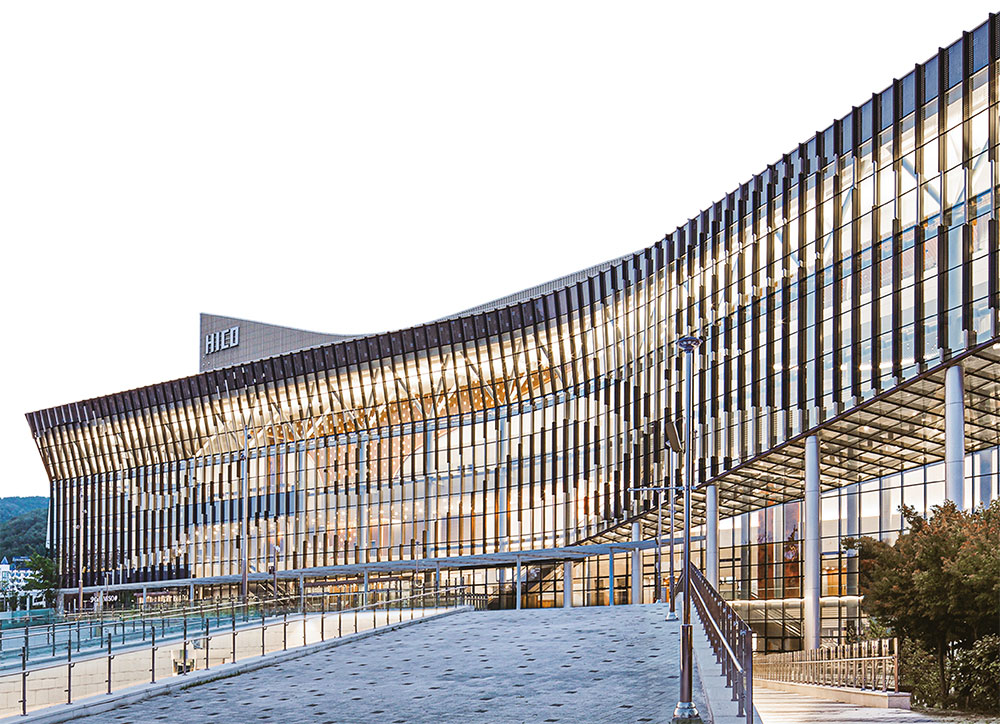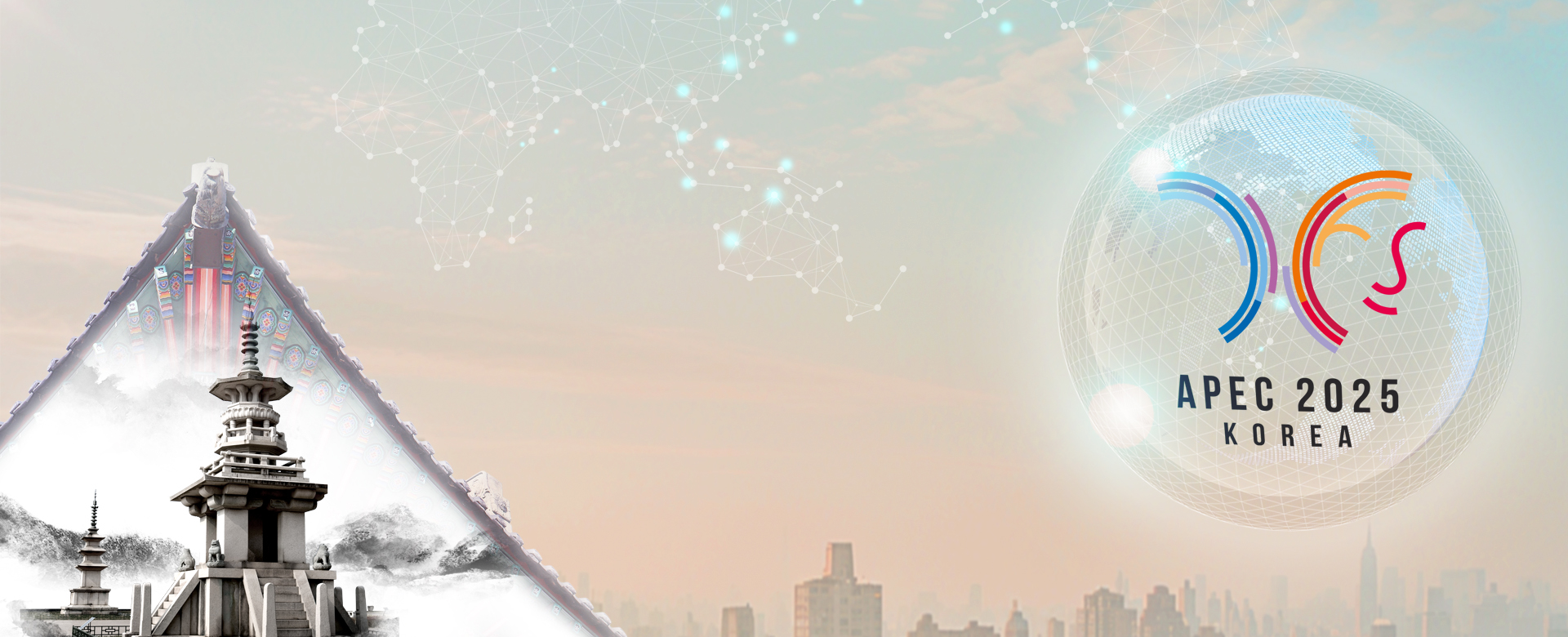APEC 2025 KOREA
A Sustainable Tomorrow
Shaped by Business
APEC 2025
The most traditional of Korean cities, Gyeongju, is transforming into one of the most global. This October, leaders from across the Asia-Pacific, along with business and academic figures, will gather to address a wide range of pressing topics from AI cooperation to demographic shifts while exploring new opportunities. In Gyeongju, where tradition meets modernity and the local intersects with the global, discussions that will shape our tomorrow are set to unfold.
By Seong-mee Yoon, Chair of the 2025 APEC Senior Officials’ Meeting

Profile
- SOM Chair, APEC 2025 Korea (December 2024–Present)
- Deputy Permanent Representative to the ROK Permanent Mission to the United Nations in Geneva
(October 2022) - Director-General for Protocol Affairs (November 2020)
- Minister-Counselor, ROK Permanent Mission to the United Nations in New York (July 2015)
- Director, United Nations Division, International Organizations Bureau (December 2011)
- Joined the Ministry of Foreign Affairs (May 1994)
From October 31 to November 1, the Republic of Korea will host the APEC Economic Leaders’ Meeting in Gyeongju. Preceding the Leaders’ Meeting, key business events, including the CEO Summit, will take place from October 26 to 31. This marks APEC’s first return to Korea in 20 years, following the 2005 Busan Leaders’ Meeting an opportunity not only to elevate Korea’s global standing, but also to showcase our capabilities to the world. More than a diplomatic milestone, this APEC gathering also presents a timely opening for the private sector.
APEC, the world’s largest regional economic cooperation forum, includes 21 member economies such as the United States, China, Japan, and Russia. Together, these members account for approximately 62% of global GDP and 51% of international trade. Since its founding in 1989, APEC has tackled major global economic issues ranging from trade and investment liberalization to digital transformation and structural reform. Grounded in the belief that the private sector should be the primary beneficiary of liberalization efforts, APEC has long emphasized public–private partnership and institutionalized business engagement.
A Platform for Corporate Engagement
The APEC Business Advisory Council (ABAC), composed of representatives nominated by each member economy, convenes four times annually to consolidate industry perspectives. These recommendations are then conveyed directly to policymakers during the “ABAC Dialogue with APEC Economic Leaders” and CEO Summit held on the margins of the APEC Economic Leaders’ Week. It is, in effect, a direct channel through which businesses can access and influence policy without bureaucratic layers. This structure fosters a virtuous cycle business ideas feed into policy, which in turn translates into institutional reforms.
A notable outcome of such collaboration is the APEC Business Travel Card (ABTC), introduced in 1997. The program streamlines cross-border business by offering visa exemptions and expedited customs clearance for member economies.
Over 40,000 Korean businesspeople currently benefit from the card, and its recent transition to a mobile format has made it even more convenient. What might seem like a minor procedural improvement has, in fact, become a prime example of practical diplomacy that cuts costs and saves time for companies.
APEC: An Incubator of Ideas
Another hallmark of APEC is its non-binding framework. While agreements are not legally enforceable, this flexibility serves as fertile ground for testing new ideas. It is precisely this openness that enables members to explore emerging issues like artificial intelligence, demographic changes, and the cultural and creative industries making APEC a true incubator of ideas. This year, Korea is leveraging APEC’s creativity and openness to drive forward the theme, “Building a Sustainable Tomorrow: Connect, Innovate, Prosper.” These three pillars represent Korea’s vision for the region and the direction in which the Asia-Pacific should collectively move.
Connection goes beyond trade and investment liberalization. It encompasses infrastructure, regulatory alignment, and people-to-people exchange, all aimed at deepening economic integration in the region. Innovation underscores Korea’s commitment as a digital powerhouse to bridging the digital divide and leading efforts to unlock new growth engines, such as AI. Shared prosperity reflects a regional commitment to tackle global challenges like energy and food security and demographic shift through sustainable and inclusive growth.
This year, Korea has proposed two deliverables for APEC 2025: AI cooperation and responses to demographic change. While these issues profoundly impact the region’s economic and social fabric, this will be the first time that APEC formally address them at leaders’ level. The goal is to develop collective responses and explore shared commitments.
“This year, Korea is leveraging APEC’s creativity and openness to drive forward the theme: “Building a Sustainable Tomorrow: Connect, Innovate, Prosper.” These three pillars represent Korea’s vision for the region and the direction in which the Asia-Pacific should collectively move.”

AI Cooperation: A Growth Engine for All
Artificial intelligence has evolved beyond a mere technology; it is now a game changer that determines the competitiveness of nations and companies alike. Across virtually every sector including manufacturing, services, logistics, and healthcare it is driving productivity gains and cost reduction. At the same time, AI poses complex ethical challenges, such as access barriers in development, unfairness stemming from data bias, and privacy concerns. In response, Korea has proposed the “APEC AI Initiative,” emphasizing the need for a shared vision at the APEC level so that AI can serve as a growth engine for all member economies in the Asia-Pacific. This initiative aims to strengthen the AI capabilities of all stakeholders including governments, businesses, workers, and consumers and to establish a sustainable ecosystem for AI infrastructure investment. In July, ABAC members adopted the “Voluntary Declaration on Sustainable AI Infrastructure and Investment,” underscoring industry-wide support and alignment.
Demographic Shifts: Turning Crisis into Opportunity
Low birth rates and population aging are challenges faced by many APEC members, including Korea. The shrinking working-age population leads to lower productivity, while aging societies face mounting pressure on public finances due to rising demand for healthcare and eldercare services. Moreover, a shrinking consumer base complicates efforts to sustain long-term growth.
In response, Korea has proposed the Collaborative Framework for Demographic Changes. The framework aims to turn demographic challenges into opportunities for growth by building sustainable social systems, advancing healthcare and caregiving through technological innovation, improving labor mobility, and expanding economic participation by women and youth. It is expected that this framework will also serve as a useful model for long-term workforce planning and enhanced ESG management within the private sector.
Alongside the agenda, equal importance is placed on the approach to dialogue. Over the course of this year, Korea has chaired four Senior Officials’ Meetings (SOMs) and convened ministerial-level discussions across a wide range of areas, including oceans, human resources, education, trade, anti-corruption, digital and AI, food security, women, cultural and creative industries, and energy. Notably, Korea hosted APEC’s first-ever High-Level Dialogue on Cultural and Creative Industries to serve as a potential new growth driver for the region and a foundation for sustained and structured discussions.
During the Third SOM, Korea organized two days of public-private dialogue on AI and demographic change. Participants from industry, academia, and civil society offered concrete proposals ranging from regulatory reform and bold R&D and infrastructure investments to structured talent development and global talent recruitment. This initiative was a deliberate effort to incorporate field-based insights and actionable solutions into APEC’s policy discourse. The next challenge is to translate this momentum into tangible outcomes at the upcoming APEC Economic Leaders’ Meeting in October.
Gyeongju on the Global Stage
This October, global leaders and influential business figures from across the Asia-Pacific will gather in Gyeongju, Republic of Korea. In particular, the APEC CEO Summit, held alongside the Leaders’ Meeting, will host a wide array of participants, including chief executives of global companies, startup founders, and leading economic thinkers.
Korean companies are encouraged to engage actively not only to track the CEO summit’s outcomes but also to seize the opportunity to hear directly from key voices shaping the global economy, explore collaboration prospects, and expand their international networks.

